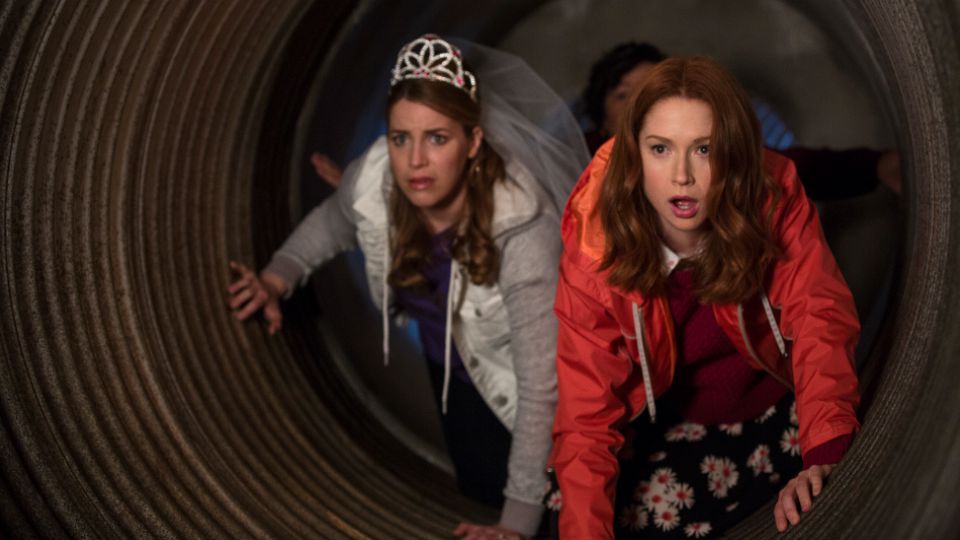
When ScoMo first announced the three stages which would see restrictions lift and society back to normalcy, my reaction was that I didn’t feel ready – and I’m not the only one.
Speaking to friends, family and colleagues (either by FaceTime or in activewear for the fear of being fined) it seems many of us are feeling a little uneasy about slowly, but surely, resuming where we left off.
It’s odd given how we’ve been feeling robbed the past couple of months – terms like “when this is all over” and “when everything’s back to normal” have been repetitive – and this only adds to the crippling mindscrew of how we should be feeling versus how we’re actually feeling.
I spoke with Jason Vella, Psychologist and Head of Clinical Quality & Innovation for Medibank, about a few feelings people are having right now as we head back to normalcy.

PEDESTRIAN.TV: What feelings are we likely to experience as we ease back into normal life, after months of restrictions?
Jason Vella: Some of us will be elated to get back out to activities that have been impossible for several weeks, whilst others will face apprehension about what the future holds for our occupations and our health.
There are two important things to remember about any feelings we experience. Firstly, noticing how you are feeling moment to moment is a skill in itself that is worth developing. Secondly, there is no normal to compare yourself to, you only need to respond constructively to the way you find yourself feeling, however welcome or uncomfortable that may be.
PTV: What about people who can’t necessarily return to normal, like those who lost their jobs and are trying to find work?
JV: Looking for a job strains our ability to stay focused and confident in the best of economic circumstances. You may find yourself frustrated and worrying about your immediate situation, as well as the rollercoaster of highs and lows associated with finding, applying and interviewing for good job vacancies.
Recognising what impact these two massive challenges have on you and having a plan, however informal, for how you will balance job seeking with other activities. This will help you sustain a positive view of yourself and the world around you.
PTV: What sort of pressures are people likely to feel when it comes to social invitations they don’t necessarily want to go to?
JV: Pressure to participate in social events come at us in different ways from the different people in our lives; partners, friends, family, colleagues. It is safe to assume you will start to feel very familiar expectations from the people in your life creep back in as restriction start to lift.
Physical distancing remains an important way of keeping the virus under control however, and this is a new personal boundary we have to learn to negotiate. I think we will all need to be reminded that none of us quite knows what is normal anymore in this regard. Decide for yourself which people and in what circumstances, you will or won’t maintain physical distancing. Expect that the new norm might include asking people to respect your position a few times before it becomes habit.
PTV: How might people feel when they come out of isolation and other people used the time to upskill, if they themselves didn’t?
JV: One of the ways our own happiness is undermined is through comparison with others. We’ve known that as long as we’ve been able to worry about ‘keeping up with the Joneses’. If comparing what you and others worked on during the pandemic causes you to feel uncomfortable, a constructive way to respond might be to use it as motivation to work on something important to you.
If you automatically started thinking something negative about your chances of working on something, then the thing to work on might be facing down those automatic thoughts. Those thoughts are not the sum total of who you are and what you can achieve.
PTV: How might people feel if they had projects they had planned for isolation, like courses, that they can no longer fulfil back in a life with everyday responsibilities and commitments?
JV: Changes have been coming at us quickly in ways which eliminated our usual daily activities, and then asked us to resume an uncertain, ‘new normal’ way of daily life. It would be understandable to feel frustrated by the lack of control over these rapid changes.
You might feel you have barely accepted feelings of loss about your original activities, before you are faced with a feeling of loss associated with giving up your new pandemic choices.
If this hiccup in the usual pace of life has given you an opportunity to discover something new you enjoy, it might be worth looking for ways to incorporate it into your future plans.
PTV: Can we expect an element of social anxiety after finding a new way to socialise behind a screen in isolation?
JV: You might find yourself feeling a heightened sense of worry or anxiety in response to the lack of predictability that social situations are going to present as we come out of isolation. The social contract has changed in the presence of this virus; elbow bumping, physically distanced queues, plastic shields in places there were none before, are all prompts for us to question exactly how to treat each other. I think we need to give ourselves and those around us permission to ask and negotiate what is normal for the next little while.
PTV: How might people feel if they were in a “just grateful to have a job” phase during isolation, but outside of isolation still restricted by job or life-changing opportunity?
JV: Job satisfaction is made up of several factors which might have been positively or negatively impacted by the changes required of your workplace. If the pandemic has made you more grateful to be in your job, but nothing else that was frustrating you about it has changed, you can probably expect those frustrations to creep back in over time. Reviewing how you have responded to the changes required in your job might be a good indication of what kind of change you are looking for in the future.
PTV: Even out of isolation there’s still an element of uncertainty to making plans for the future. How might people struggling with motivation to make changes?
JV: You are more likely to feel motivated to take steps towards achieving your plans when you have been successful completing the step you took before. Carve up your plans into individual steps, each of which are small enough to achieve in whatever envelope of time you have available each day or week.
No matter how much you get done in each step, remind yourself that you are successfully managing your stepwise plan each time, and getting closer to your goal as a result.
PTV: How can the differing expectation around socialisation – like social distancing and no hugging / greetings – affect both relationships and personal wellbeing?
JV: Differing expectations about how we behave around, and interact, with each other is so often the source of unintentional tension in relationships. Don’t be a mind reader, and don’t assume the important people around you are either.
If you can be clear and respectful about what your behaviour means to you, and be open to understanding what others’ behaviour means to them, you are more likely to find a middle road where different parties well-being is being met.
PTV: How about paranoia and fear of being outside, with the understanding that you might be in the company of a COVID-19 carrier?
JV: Whether it is paranoia, fear, racism or just squabbling over the last pack of toilet paper, the best antidote is to arm yourself with accurate knowledge, so you feel properly prepared for the challenge of re-engaging with life.
Understanding how the virus transmits and what steps you can take to reduce your risk is a more effective option scrolling your Facebook feed for medical advice.
If you or someone you know needs help, in partnership with Medibank, the Beyond Blue Coronavirus Mental Wellbeing Support Service has been set up to provide access to a range of online resources and 24/7 support from trained counsellors on 1800 512 348.



